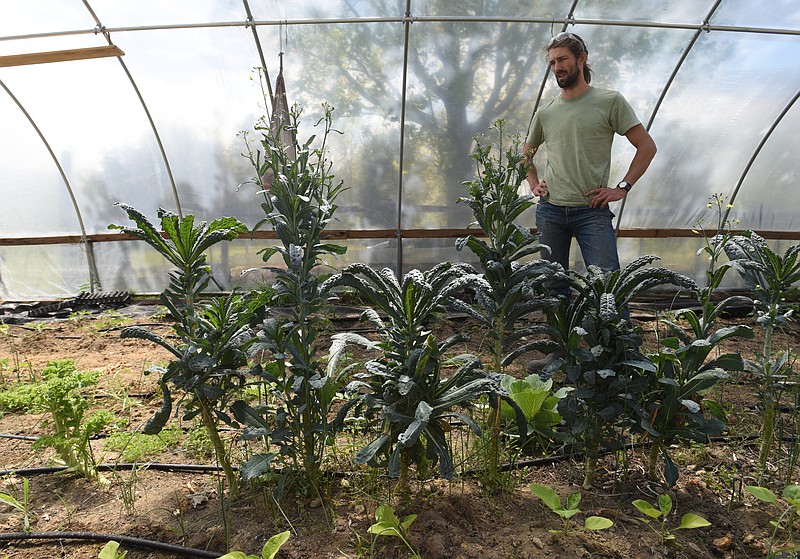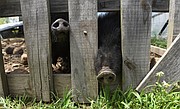About Community-Supported Agriculture
A CSA is an association of food buyers and growers who have pledged to support local farms and share the risks and benefits of food production. CSA members, or subscribers, pay at the onset of the growing season for a share of the anticipated harvest; once harvesting begins, they periodically receive shares of produce.
TRENTON, Ga. - Following in Stephen Bontekoe's footsteps on his four-acre mountaintop farm just outside Trenton, it becomes a game of not stepping on precisely positioned plant rows running back and forth here and there.
He rattles off why the strawberries are here, why the kale in the tunnel does better than the kale planted outdoors on the other side of the goat pen. He explains why the pigs, Sassy and Frassy, are stomping around on crushed coconut shells and why the bees don't sting you when you pass by their box.
Bontekoe breaks a slim stem from a growing dill plant and presents it with an outstretched arm - try this. Crushed in the hand, the dill smells strong, but tastes stronger.
This is what Bontekoe wants his potential customers to understand: in today's commercial on-demand world, he and a growing number of farmers everywhere still believe in the value of small-scale, locally grown produce and the intimate relationship between farmer and food.
Bontekoe is heading up a new cooperative of local, heritage-style farmers - farmers who still use age-old methods like horse and plow - who are launching their own community-supported agriculture, or CSA, program this year.
The co-op and CSA program are called Heritage Harvest Farms, and promise fresh, locally-grown produce delivered weekly to a handful of drop sites around Chattanooga. Bontekoe emphasizes that in the program, like other CSA program which operate in and around the city, produce is often hand-picked the day of delivery.
He said customers are "able to get high-quality food, picked fresh" through a program like Heritage Harvest.
The CSA model isn't new, not even to Chattanooga. Other local farmers have operated CSAs here for nearly two decades. But buying local food is trendier now than in years past, and consumers appear to be increasingly hopping on board.
Debbie Ball, director of marketing at the Tennessee Department of Agriculture, said CSA programs "are definitely on the rise."
"They are definitely gaining in popularity for both the consumer and the farmer," she said. "Consumers today want to know where their food comes from and how it is produced."
In a CSA program, a farmer or group of farmers promises to deliver locally-grown, fresh produce to customers who in return sign up and pay for a subscription. The money from subscriptions funds the farmers.
There are currently nearly 100 different CSA programs across Tennessee. Within 50 miles of Chattanooga, the web site Local Harvest identifies 23 CSA-supported farms. All CSA programs in the state are listed online at the Pick Tennessee Products website, www.picktnproducts.org.
Ball said the CSA format first appeared in Japan in the 1960s. It took 20 years for America to adopt the model, with CSA programs first appearing in Massachusetts in the 1980s.
Because the model calls on monetary commitment from the customer in order to secure financing for farmers, "this is especially beneficial to small and beginning farmers," she said.
Lori Riley, director of the Lookout Farmers Market, said she has seen demand for local food increase sharply in recent years. She's been a local food proponent since before it was cool, she says.
"Now, we have a lot of folks who believe the same way, and there is a lot of passion about that," Riley said. "Because you are what you eat, and if you're eating a daily dose of fast food and chemicals, your body is probably not going to be as healthy as it could be."
Riley has a small farm and manages the Lookout Farmers Market's three locations in St. Elmo, Red Bank and East Brainerd.
She loves the idea of eating local, but also emphasizes the practical aspects of buying from local farmers. The money, she says, stays here instead of going somewhere else.
"I have the satisfaction of knowing I helped a family, a real life family, keep their farm and keep the income for their family," Riley said. "And for the most part it's less expensive. And even if it is more expensive, it's worth it because you're supporting a real-life human being."
Thomas O'Neal is also a local farmer running a CSA program. O'Neal has run Signal Mountain Farm since 1998. He packs produce into boxes through the spring and summer and delivers to subscribers, which he said could reach around 200.
"It definitely has picked up in popularity," he said earlier this week. "We've seen our business improve over the years, especially over the past five years."
He stressed that because CSA programs connect local farmers to local buyers, buyers should expect to eat seasonally.
"You're not going to get corn in April, and you're not going to get lettuce in July," he said, though he also said his farm grows around 50 different items.
Like other local farmers, O'Neal said locally-grown produce like his comes to the consumer fresh, and travels a dozen, rather than a few hundred, miles between farm and table.
"We're the ones growing the stuff," he said. "You're getting it directly from the grower."
A full share subscription to O'Neal's program is $698 for 18 weeks of packed boxes of food, spanning from mid-May to early fall. A half share subscription, or lesser portion, is $450. Signal Mountain Farm is certified organic and delivers to seven different locations.
Stephen Bontekoesaid on the eve of Heritage Harvest's first drops (which go out May 3) the CSA had yet to hit the "magic number" of subscribers. He wants to hit 50 subscribers this year, at $28 a week or $112 a month with a minimum three-month commitment, necessary for the farmers' investment.
The CSA, at its best, provides financial security for the farmer - it's the guaranteed purchase of produce grown.
"His livelihood is dependant on it," said Bontekoe.
He wants to hit 200 subscribers by the end of the growing season this fall, and like Riley and O'Neal, points out the practicality of buying local.
"If you're an accountant, you want to buy from a local farmer, because that farmer needs his taxes done," said Bontekoe. "That money is going to be around for you to touch again."
Contact staff writer Alex Green at agreen@timesfreepress.com or 423-757-6480.

